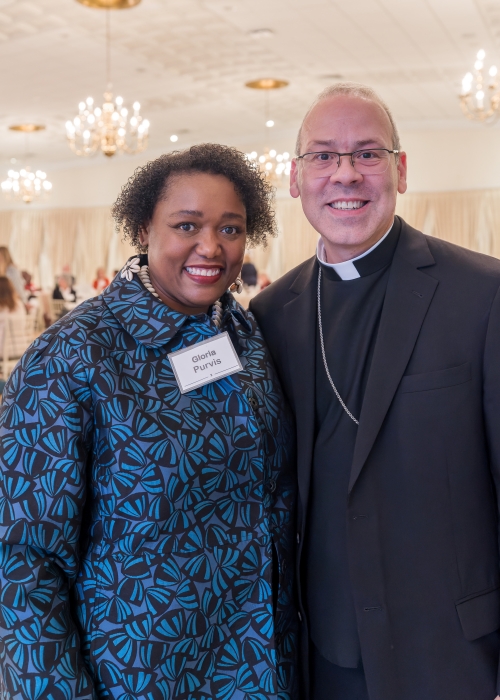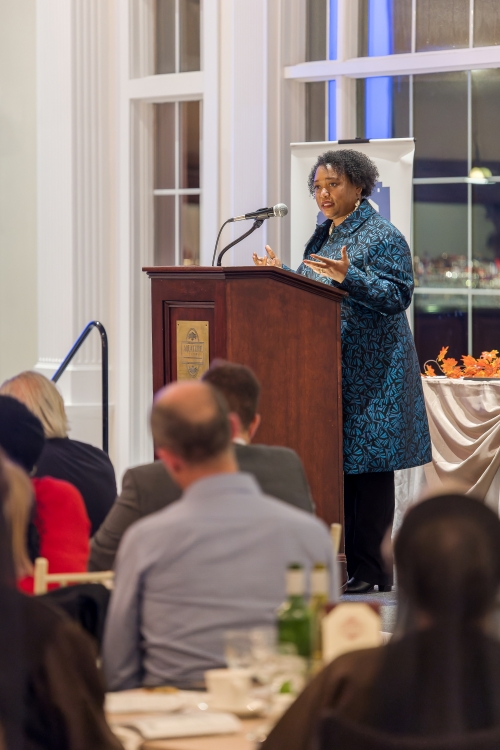Story by Shelley Wolf

Gloria Purvis, host of “The Gloria Purvis Podcast,” shares a moment with Auxiliary Bishop Juan Miguel Betancourt at this year’s Social Justice Dinner and Awards at the Aqua Turf Club in Plantsville. Photo by Aaron Joseph
PLANTSVILLE – When Gloria Purvis was at Mass in Washington, D.C., some years ago reciting the Nicene Creed, she distinctly heard the voice of God. After she uttered the words, “I believe in the Holy Spirit, the Lord, the giver of life,” she says she heard what she refers to as a “mini-chastisement” from above.
According to Purvis, “I heard a voice saying to me, ‘Are you lying? Are you blaspheming? How can you say you believe in the Holy Spirit, the Lord, the giver of life, and you do nothing to protect my gift of life on earth? How do you expect to receive the gift of eternal life?’”
Or as Purvis sums it up, “I was a comfortable in-the-pew Catholic, you see, and I felt like God was saying, ‘You say you love me but, girl, what are you doing?’
“That’s the question we all have to ask ourselves. We say we love the Lord, but what in our life demonstrates that?” asks Purvis. She says she supports personal devotions, “But then what?”
Purvis challenged an audience to plenty of soul-searching as the invited speaker at the annual Social Justice Dinner and Awards celebration held this fall by the Archdiocese of Hartford’s Office for Catholic Social Justice Ministry. Purvis is the creator, host and executive producer of the “The Gloria Purvis Podcast” of America Media, which can be found on most podcasting platforms.
‘An Anemic Understanding of Human Dignity’
Commanding the room, Purvis, an African-American Catholic speaker and podcaster, says she was awestruck by those challenging questions and began to study Scripture in response, starting with Genesis, to better understand God’s plan.
She was immediately fixated on Genesis 1:26, which says “Let us make man in our image, after our likeness.” For Purvis, the ancient Bible story of creation provides the answers to why we need to “build a culture of life,” and “resist the throwaway culture,” as Pope Francis has advised.
“I had read that so many times. But at this particular time, when I read it, it just consumed me,” she says. “Because there’s so much in what God said about who we are, each and every one of us. Being made in the image and likeness of God is the reason why we are worthy of dignity and respect.”
In her opinion, many Catholics still don’t fully grasp the dignity of the human person, which forms the foundation of a moral vision for society. “Nothing you can do or will do can undo the truth of who you are. Nothing. And I think as Catholics, we have a very anemic understanding of human dignity,” Purvis says.
“A lot of times it’s conditioned on whether a person is innocent,” she says, but that should not be the only reason why we defend that person’s life. “I’m talking about whether it’s the child in the womb or the immigrant at the border. We care for the human person as a matter of justice. And justice in the Catholic understanding is giving a person what they are due.”

Gloria Purvis addresses social justice advocates, challenging them to think about the dignity of the human person and whether they have fallen short in seeing others as God intended. Photo by Aaron Joseph
Purvis sees respect for others as an obligation. “It should be an obligation out of love. It should be an obligation of remembering who God said we are. And to rebel against God’s word is to sin gravely,” she insists. “It’s why we see this rupture in the human family that we do today, whether it’s the evil of abortion, where we try to dehumanize a child in the womb and do violence to the woman and run away from the natural consequences of sex, or the great evil of racism.”
Racism, Power and Selfishness
According to Purvis, racism, which is still with us, has simply become more visible in the past few years. She has thought deeply about the problem of racism, mining its sinful source.
“At its core is this selfishness, really,” she says. “We don’t want to share, if the demands of justice require that we give up our positions and stations of power. We should not be seduced by this temple of power, because it’s nothing more than the enemy whispering in our ear to rebel against who we are.”
If we are all made in the image and likeness of God, we should all have equal status, she says, and any laws, customs and traditions that undercut the flourishing of a targeted group should be “odious” to Catholics. “Why? Because sin is chiefly and foremost an offense against God,” she points out.
If we are honest with ourselves and discover we are not loving God and our neighbor, and not demonstrating our Catholic values, Purvis recommends turning to a higher power. “God is a merciful God, who wants us to do the work of conversion, repentance, reparation. And he gives us the grace to be able to do that,” she stresses, through the sacrament of reconciliation.
Turning to God for help and growing in holiness should be a constant in all our lives, Purvis says, noting that she has her own struggles, which always remind her how much she needs God. “If we’re going to resist the throwaway culture, if we’re going to build a culture of life, we have to recognize the deficiencies in ourselves as well,” she admits.
Purvis also challenged the audience to extend their respect to imperfect people. “Are you conditioning your love and respect for another on their perfection or on their likeability?” she asks.
As a test, she mentioned the video of the murder of George Floyd, noting that after the story broke, some Catholics dismissed the incident, telling Purvis that Floyd had a criminal background. “No one, no matter what they’ve done, no one deserves to be treated that way. No one. No one,” she recalls telling those people.
“And that’s when I started to say, ‘Lord, help open our eyes, to see the true dignity of each and every human person. Help us to remember what you said about who we are. Let us not fall prey to the temptation that only the perfect and the pretty are to be loved and cherished.’”
Abortion Access for Black Women: Justice or Rot?
Purvis notes she is also troubled by how the pro-abortion lobby has been “using Black women as a mascot for abortion.” They are claiming that Black women will be disproportionately affected by more restrictive abortion laws, yet deserve the same legal access to abortion as wealthier White women.
“Of all the things that rich White women have that poor Black women don’t have, abortion is not the top thing,” Purvis says. “We want all the things these rich White women take for granted, you know, safe neighborhoods, access to food, clean water, good jobs, and good education. That is a measure of equality, not the ability to be able to take the lives of our unborn children.”
She cautions against this faulty logic. “And by the way, whoever thought killing the poor was a solution to poverty?” she asks. “It makes no sense. This is what I mean by resisting the messages, because it sounded so high-minded and sweet and just, but when you look at the root of it, it’s rotten. Just as the messaging around racism is rotten.”
To build a culture of life and resist the throwaway culture, Purvis recommends Catholics reject much of what they see and hear on various television news programs “and replace it with the Gospel.”
“Please spend your time reading the Bible,” she implores. “Please spend it in prayer.” Purvis strongly recommends praying The Liturgy of the Hours or reading the writings of the saints. “I’m partial to St. Teresa of Avila and St. Francis de Sales.” Pick any one, she says.
“We have got to form our minds contrary to the thinking of the age,” Purvis insists. “And we cannot do that if we get our catechism from every place but the Catechism. We have to be sensitive to what it is that we hear, what it is that we repeat, and what it is that we spend our mind on.”
Purvis received a standing ovation for her talk. For more information on the Office for Catholic Social Justice Ministry, visit catholicsocialjustice.org or facebook.com/ocsjm.hartford.
